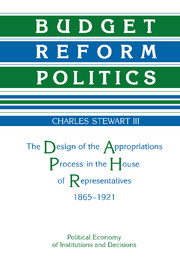 Budget Reform Politics
Budget Reform Politics Published online by Cambridge University Press: 03 September 2009
This Cambridge series, Political Economy of Institutions and Decisions, is built around attempts to answer two central questions: How do institutions evolve in response to individual incentives, strategies, and choices; and how do institutions affect the performance of political and economic systems? The scope of the series is comparative and historical rather than international or specifically American, and the focus is positive rather than normative.
Charles Stewart's work has two important features. One is his use of rational models of congressional changes in budget procedures between the Civil War and the end of World War I. Linking congressmen's career objectives to their local constituencies, he applies the modern Congress model in which a decentralized electoral process leads congressmen to prefer particularistic, localistic policy production over national-interest legislation. He shows that this demand for localistic policy leads to institutional or structural fragmentation, and conflicts with existing leadership and committee structures as well as with the centralizing demands of war and other crises. The political economy of this conflict, which produces opportunities for countervailing reforms, explains the evolution of budget procedure in the long run.
The other prominent feature of the book is Stewart's careful quantitative modeling of budget and spending decisions and outcomes with explicit reference to the impact of institutional constraints. Analyzing the devolution of budget powers of 1885 and its attendant surges in spending, he argues that rather than devolution of power causing spending, both follow from broader social and economic changes that increased demand for spending.
To save this book to your Kindle, first ensure [email protected] is added to your Approved Personal Document E-mail List under your Personal Document Settings on the Manage Your Content and Devices page of your Amazon account. Then enter the ‘name’ part of your Kindle email address below. Find out more about saving to your Kindle.
Note you can select to save to either the @free.kindle.com or @kindle.com variations. ‘@free.kindle.com’ emails are free but can only be saved to your device when it is connected to wi-fi. ‘@kindle.com’ emails can be delivered even when you are not connected to wi-fi, but note that service fees apply.
Find out more about the Kindle Personal Document Service.
To save content items to your account, please confirm that you agree to abide by our usage policies. If this is the first time you use this feature, you will be asked to authorise Cambridge Core to connect with your account. Find out more about saving content to Dropbox.
To save content items to your account, please confirm that you agree to abide by our usage policies. If this is the first time you use this feature, you will be asked to authorise Cambridge Core to connect with your account. Find out more about saving content to Google Drive.